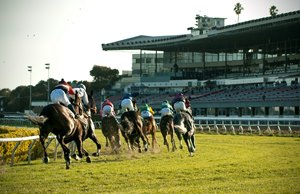Golden Gate Racing Suspended by Health Department


In accordance with instructions received the morning of April 2 from the Alameda County public health officer, Golden Gate Fields will temporarily close for live racing effective immediately in response to the COVID-19 pandemic.
The Northern California track issued a release after canceling the Thursday card, stating it "is abiding by the instructions issued two weeks ago by the California Horse Racing Board to operate under the sanction of the local health authorities."
At this time, there are no known cases of COVID-19 at Golden Gate Fields.
Santa Anita Park in Southern California has been shuttered since March 27 under a similar order from the Los Angeles County Health Department. Both tracks had been racing without spectators, limiting attendance to horsemen and necessary racing and track employees.
CROSBY & KING: Health Department Order Suspends Racing at Santa Anita
The suspension of racing was announced about midday Thursday and came as a blow to Northern California trainer Blaine Wright, who was prepared to start Sadie Sue in Golden Gate's third race. Like many horsemen around the country who have experienced COVID-19-related suspensions and shutdowns, he said he feels for all those impacted, from owners to his employees.
"All of us are worried about feeding the mouths that are working for us, not just our grooms but their wives and their kids. There are a lot of people depending on us here," he said. "Trainers' profit margins aren’t real big, and you just hope the owners will stick with it, and at the same time, they have to be able to run for prize money in order to stay in the game."

Horsemen representatives and The Stronach Group, which owns Santa Anita and Golden Gate, have maintained that racetracks are essential businesses in need of continued operations, providing care to animals, and that afternoon racing encompassed fewer participants than permitted morning training.
Wright praised the work of Golden Gate officials to maintain racing in recent weeks while the crisis grew.
"At Golden Gate Fields, the health, safety, and welfare of every person and every horse in our community is our top priority," read the Golden Gate news release announcing the suspension of racing. "This measure is being taken in response to a mandate from Alameda County officials.
"At Golden Gate Fields, there are over 1,200 horses stabled who require daily care. That care is provided by the 400 backstretch team members, most who live on-site and have been operating under stringent new measures for protection aligned with the best guidance from local and international health and government authorities on COVID-19. The track has been closed to the general public and closed to all but essential personnel since March 12, 2020.
"We will continue to work with authorities to familiarize them with the protocols, which have been put in place to protect the health and safety of those who work with the horses and the horses themselves.
"We look forward to the return of live racing at Golden Gate as soon as approval is received from local regulators."
Greg Avioli, the president and CEO of the Thoroughbred Owners of California, said the suspension of Thoroughbred racing in the state affects approximately 2,500 Thoroughbred racehorses in Southern California, divided between Santa Anita Park, Los Alamitos Race Course, and San Luis Rey Training Center, plus those at Golden Gate.
"We’re going to do everything we can to make sure we have enough facilities open and available for housing and training of the horses we have," he said.
He anticipates some owners will elect to move horses to farms, and others might maintain on-track training, perhaps at a reduced rate.
"Owners have to make their own mathematical calculations," Avioli said. "But one thing owners will have to factor in, if you take your horses back and take them to a farm, take them out of training, you’re (facing) at least a month ramp-up once racing gets going again before you will be race-ready."
The uncertainty of the COVID-19 crisis and its impact on the racing industry also has Wright at a loss regarding how to advise clients and staff.
"You want to know what to tell people, and you don’t know what to tell them. You don’t know how long this is going to last," he said.
